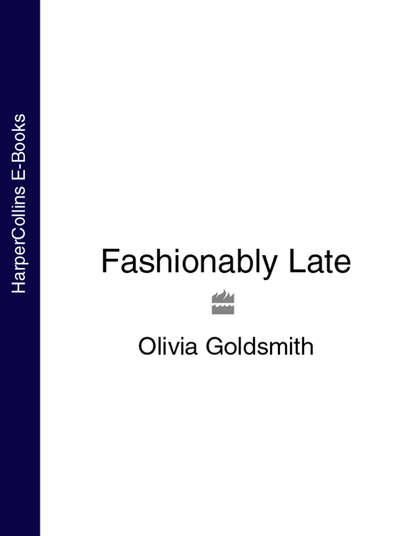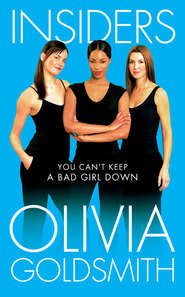По всем вопросам обращайтесь на: info@litportal.ru
(©) 2003-2025.
✖
Fashionably Late
Автор
Год написания книги
2018
Настройки чтения
Размер шрифта
Высота строк
Поля
Karen stopped herself. There I go, blaming my job for my infertility. Karen reminded herself again that the doctor had said the problem was not entirely age-based; that it was probably congenital. How had he put it? That ‘it was aggravated by age.’ Well, she was aggravated, all right. Karen couldn’t put the idea out of her mind that if only she and Jeffrey had tried earlier, if they had put just a little of their effort into reproduction instead of into the business, they might have succeeded. She was famous – infamous really – for never taking no for an answer. ‘If you don’t take no, you’ve got to get a yes,’ she often told her staff. But she’d have to take a no on this.
Of course, they could try to go the petri dish route. But Karen knew that Jeffrey would be opposed, and she was herself. After all, with all the unwanted babies, all the hungry and homeless in the world, how could she justify spending thousands just to try to perpetuate her genes? Somehow, it didn’t work for her. Not that there were any guarantees, anyway.
If only I’d tried earlier, Karen thought. If only I’d …
That’s crazy, she told herself. That’s the backlash of guilt women feel if they can’t do everything perfectly. Look at Connie Chung. Is she busy hating herself this afternoon? You’ll drive yourself meshuggah with this, so stop it.
The taxi jerked to a halt behind a bus that was belching black smoke and also had one of those annoying John Weitz ads staring at her. The cab was still three long blocks from Penn Station and they were the three cross-town blocks of Thirty-Third Street that would be hell on a rainy Friday. Fuck it, Karen murmured to herself, and leaned forward, putting her face close to the hole in the bulletproof plexiglass partition that separated her from the driver. ‘How much to drive to Long Island?’ she asked.
‘JFK?’ he questioned with a voice that rose in a hopeful Pakistani-like lilt.
‘No. Rockville Center. On Long Island. Only a little further than JFK,’ she lied. But she was desperate. Still, she wondered if she had enough cash. One of the perks of success: Karen hadn’t been in a bank in years. Her secretary got her cash, but Karen perennially ran short of it. She’d made a habit of tucking folded hundred-dollar bills into the zipper compartments of all her purses. Emergency money. She opened this one and, sure enough, there was the hundred. She took it out, unfolded the crisp creases, and showed it to the driver, slipping part of it into the little scoop for the fare. He eyed it hungrily and turned off the meter.
‘How we go?’ he asked. The accent didn’t really sound Pakistani. And that odd bolero jacket he was wearing was interesting. If it was done in a faille … Anyway, he wasn’t Pakistani. Maybe Afghan. They drove camels, not Buicks, didn’t they?
‘Through the Midtown tunnel, then the LIE. Not too far,’ she lied again. Well, it would probably take less time to get to Rockville Centre than it would to get across Manhattan. And she just might, with luck (and if they beat the traffic even by only a few minutes), make it to Belle’s house in time for dinner.
To her relief, the driver agreed. Karen directed him to turn east instead of west and leaned back on the thinly cushioned plastic seat, clutching her hands over her perpetually empty womb. It will be okay, she told herself. Jeffrey will understand. He won’t be too disappointed and we can start to talk about adoption. We may be a little old for the Spence-Chapin agency’s standards but Sid could probably arrange a private adoption, or know lawyers who do. Money would be no object and they would have their baby. It will be all right, Karen told herself. She wouldn’t take no for an answer.
The approach to the Midtown tunnel was utter chaos – Karen imagined it looked like the final evacuation of Saigon. The cabbie lurched behind a huge eighteen-wheeler and jockeyed into position. The fumes were unbearable. Karen watched as all that metal tried to insert itself into the narrow tunnel opening. It was a lot like the medical procedures she’d been through lately, she thought with pain. Not that they’d done any good. She sighed. As the taxi began to inch its way into the mouth of the tunnel, the radio with its ghastly music cut off. Karen, grateful, closed her eyes against the glare of the tunnel lights and waited while the double-lane procession of vehicles made their escape from New York.
At last the cab surged out of the Midtown tunnel toward the LIE. The misty rain was turning to a deluge, and in less than twenty minutes Karen knew that the VanWyck Expressway would be flooded, as would the BQE. The infrastructure of the city was falling to shit. ‘Hurry,’ she told the driver, trying to beat both the rain and the rush hour. ‘Hurry,’ she said aloud again, and tried to believe that once she got to her mother’s it would all be all right.
CHAPTER THREE (#ulink_31bf9a9c-33bb-57f0-841b-ae4370acbf83)
Cut from a Different Cloth (#ulink_31bf9a9c-33bb-57f0-841b-ae4370acbf83)
Karen Kahn, nee Lipsky, had been adopted by Belle and Arnold Lipsky when she was already three-and-a-half years old. That was late for an adoption. She had very few memories of her early childhood and none of that time before she lived at 42–33 Ocean Avenue in Brooklyn with Belle and Arnold. She wasn’t sure if that was normal or not, but she figured that the trauma of leaving one home for another would be enough to produce early amnesia in any child. She knew, vaguely, that she’d been fostered out, but her real memories began with Belle: Belle pushing her down Ocean Avenue toward Prospect Park in a stroller. At almost four years old, Karen must have been too big for one, but perhaps Belle had wanted to pretend that Karen was still a baby. Perhaps Karen herself had wanted to pretend it.
What she could remember clearly was the stroller, its blue and white stripes and the silly bobble fringe on the sunroof. With it, she remembered the bells of the Bungalow Bar ice cream man, and the fascinating little house – complete with shingled roof – on the back of his truck. She remembered her mother handing her that first creamsicle, and the pleasure she got not just from the taste but from the contrast of the bright orange ice and soft, white creamy center.
From around that time she could also remember an early morning visit to the Botanical Gardens: the lilacs had just come into flower and she had darted among several enormous bushes, delighted by the smell of the flowers and the exquisite colors that the purple fountain of blossoms made against the satiny green leaves. She had laughed and run from bush to bush – until she glanced around and noticed that Belle was nowhere to be seen. Karen remembered how, once she was alone, the bushes took on an ominous look, hunching over her menacingly, and she had begun to cry. When Belle found her, she had scolded Karen both for running ahead and for crying.
Belle Lipsky was not, perhaps, the ideal maternal figure. Small-boned and thin, she was always immaculately groomed and dressed in coordinated ensembles. She wasn’t pretty – her features were too sharp, too pinched – but she was what people back then called ‘well put together.’ Karen had always been proud of how Belle looked, her attitude. Karen particularly remembered Belle’s hats – already de trop back in the fifties, Belle had been loath to give them up, and Karen, back then, had thought they were the height of elegance. But the hats, like all of Belle’s clothes, were ‘for looking, not for touching.’ From her earliest years, Karen knew that she was expected to keep Belle’s and her own clothes clean and her room neat. Belle was a neatness fanatic and their Brooklyn apartment had been as sterile as Belle’s reproductive system was.
Belle and Arnold had been married for only a year when they adopted Karen. It had always been odd and embarrassing to Karen that she was older in years than her parents’ marriage, but they seemed not to discuss it, and so neither did she. Once Belle had joked that Karen had just come into the family fashionably late. Karen knew better than to ask questions. In fact, she had been taught to discuss nothing unpleasant or upsetting. Questions about her adoption were discouraged. Growing up had been all about keeping still, keeping clean, and keeping quiet. Arnold was himself a very quiet man and both he and Karen knew that if there was any talking that was going to be done it would be done by Belle.
Belle was not, by any means, a neglectful mother. It was just that there were certain areas she had interest in and others that left her cold. There was much they did together. She read aloud to Karen. (After all, she had been a school teacher.) They took walks together, and shopped for clothes. Karen was always dressed to perfection, at least until she began to assert a taste very different from Belle’s. But up to the time she was eleven or twelve, she and her mother made weekly forays to downtown Brooklyn and ransacked Abraham & Strauss. More exciting to Karen were the special Saturdays when they went into Manhattan. Then they tore through S. Klein, Altman’s, Orbach’s, and Lord & Taylor’s before stopping for lunch at the Fifth Avenue Schraft’s, where Belle always ordered a celebratory Shirley Temple for Karen and a whisky sour for herself. They had been good companions on those trips and Karen had learned not only to wait patiently while Belle tried on a myriad of outfits, but also to critically appraise them at Belle’s request. Sometimes she wondered if that’s where her interest in clothes began. Had she always had a talent for fashion? Or had Belle developed it? Because, back then, Belle had always listened soberly to Karen’s assessment.
If Belle was obsessed with shopping, Karen became equally engrossed in fashion. She collected dozens of paper dolls, and designed clothes for all of them, but paper wasn’t real, wasn’t sensual. She loved the feel of real fabrics and the numberless combinations of colors and textures. To this day, Karen believed that fashion began with the cloth, that within the fabric was the center from which she spun every outfit. Unlike Belle, she didn’t want to own clothes; she just liked looking at them and being around them. Karen felt as if she had grown up with her head tucked under a rack of clothing, surrounded by Belle’s rejects and selections, and that from her earliest times nothing had interested her more than the drape of a fabric, the contrast of piping, and the way a seam was cut.
Back on Ocean Avenue, Karen had longed for access to Belle’s closet, a walk-in that was off-limits to her. In it, Belle arranged every garment based on its color, style, and use. Not all blouses hung together; the ones that were made to go with suits hung with their matching jackets. But all skirts were separated, for some reason only known to Belle, from the rest of their ensemble and lined up along one rod, all on their own. It was an arrangement as inflexible and confusing to Karen as the Dewey Decimal System at the Brooklyn Public Library. Belle’s shoes, scarves, belts, and stockings were all arranged in meticulous order. Her mother would have known in a moment if Karen had touched anything. Belle never wore slacks – she was too short for them, she said – but she had dozens of silk dresses that Karen longed to touch and play with. Not to mention the hats. The closet was a place of wonders. But though mother and daughter shared shopping jaunts, they had never played dress-up. Belle wasn’t a playful woman.
The taxi was approaching the Rockville Center exit. The driver was talking to himself under his breath. Karen prayed that he wasn’t outraged enough by the length of the trip to dump her there, at the side of the Expressway. The rain had turned into a downpour. Karen felt as fragile as Tennessee Williams’s Blanche DuBois; and like Blanche, at that moment Karen was dependent on the kindness of strangers.
She directed the muttering driver the rest of the way and at last the taxi pulled up to the brick house with the carefully pruned hedges. Karen gave the guy the hundred and pointed the way back. She got out of the cab with relief and turned toward the house. Through the darkness, the lights of the living room chandelier glimmered. Her mother and her sister were waiting for her.
Karen sighed. Even if Belle was undemonstrative and almost anally neat, she had at least shared something with Karen. Their interest in clothes had been a bond – if only for a time. And if it wasn’t quite twenty-four-karat unconditional mother love, at least it had stood them in good stead for many years.
All that, of course, had changed when Lisa was born.
Karen’s sister, Lisa, looked nothing like her. Well, of course she wouldn’t. I was adopted, Karen reminded herself, but it still sometimes surprised her to see Lisa after a long absence. They were so very different. Now Lisa, tiny and petite as ever, stood in their mother’s living room. She was one of those small-boned, taut, thin Jewish women – if Jewish-American princess was listed in the dictionary, they’d use Lisa’s picture to illustrate it. In fact, Lisa looked a lot like their mother who, at sixty-four, still had the slender figure of a girl and the nervous energy that kept her movements youthful.
Lisa looked across the overdone, mirrored living room and smiled. ‘Look who’s here!’ she cried. She was pretty, and sometimes Karen wondered if all of her own designs, which did so much for tall women and so little for petite ones, were not an unconscious hostile response to Lisa’s looks. Karen loved her sister, but Lisa had always had it easy. Six years younger than Karen, she had been an unexpected surprise to her parents, who had long before accepted their barren marriage and compromised with Karen’s adoption. Lisa’s appearance had been an incredible renewal, a vindication of Belle’s femaleness just at the time when other women were starting to contemplate menopause. The pregnancy had given Belle not only a glow, but also a perfect little baby to dress up, play with, and show off. Just at the time when Karen was moving into her gawky stubborn stage, Belle was rewarded and distracted with an easy baby.
Lisa had accepted all the bows and frills that Karen had already begun to reject. She still wore them. Lisa went along with all of her mother’s suggestions and seemed always to do things the easy way: she got B’s in school, went to Hofstra University for only a year, and her ‘career’ had been running her own small boutique. She married Leonard when he was out of medical school and retired early to have her daughters, just like her mother. And she was clearly her mother’s favorite.
At least that was the way Karen saw it. Lisa, she knew, felt that Karen had always been favored. That it was Karen, as eldest, who got most of the attention, was considered the smart, the talented, the successful one. My mother has a political gift, Karen thought, and had to smile: Belle could simultaneously make her two daughters feel the other had most-favored-nation status. But maybe that wasn’t just Belle. Maybe it had more to do with us as sisters. Older versus younger. Adopted versus natural. Perhaps sisters never worked this shit out, Karen reflected as she smiled back at Lisa. Underneath all of it, Karen knew she loved Lisa dearly. She had loved her and taken care of her from the first time she saw her, a tiny infant.
‘How was your day?’ Belle asked.
Karen thought of the abortion of a fitting session she’d struggled through with Elise Elliot, her most important new client, an argument with Jeffrey, and the horror at the clinic, but she managed a smile. ‘Great,’ she said, because from long experience she knew that was the only answer Belle was equipped to deal with. ‘How was yours?’
‘Great,’ Belle answered brightly. ‘We went all the way over to Neiman-Marcus. Lisa bought me a great outfit. She insisted.’
‘It was on sale,’ Lisa said, and shrugged as if to say it wasn’t a big deal.
Still crazy after all these years. Karen couldn’t get over their insatiable need to shop. She shrugged. Before she was a name, she had made the effort to get the two of them into most of the Seventh Avenue showrooms, despite the trouble and ill-will it often caused. Like the notorious Gabor sisters, her mother and sister had developed a reputation for returning more stuff than they bought. But Karen at last had come to understand that shopping for them, as for so many women, was a highly developed bonding activity. It was like men with sports: a father could be completely out of touch with his son’s internal life but they could always manage a conversation about those Mets. Lisa and Belle bonded by shopping. It was unfortunate that Karen and her mother, as adults, had no longer been able to do that shopping gig. Since Karen’s interest in design had deepened, Karen had become, in Belle’s words, ‘too particular.’ And ‘too dull. You need some color.’ Color to Belle meant red and aqua and royal blue. Even now, when women paid thousands of dollars for Karen’s unique vision, her exquisitely modulated color sense, Belle had never really acknowledged that Karen’s taste had been anything but difficult to understand.
She managed to smile at her mother. ‘Where’s Dad?’ Karen asked.
‘Oh, you know your father. Working late on somebody’s stinking case.’ After more than forty years of marriage Belle had still not forgiven Arnold for only being a labor lawyer, ‘not a real lawyer,’ as Belle often pointed out. He’d never joined a Park Avenue firm and done lucrative corporate work. He’d formed his own labor practice and, worse, did a lot of pro bono. ‘A Harvard lawyer! He could have made millions,’ Belle always said regretfully.
‘So, are we eating?’ Belle asked them now. She moved through the arch to the dining room, where three places were set on the mahogany Sheraton-style table. The china was lovely – Royal Doulton – and the crystal gleamed. A tiny cachepot of violets sat at each place. Belle set a pretty table but she was less than a wiz in the kitchen. Food represented mess and bother: she’d discovered frozen entrées long before anyone else and served what Karen always thought of as ‘hospital meals’: the portions were small but no one complained because the food was so bland. And there were never any leftovers. Arnold didn’t seem to mind – aside from his work, Karen’s father noticed few details and often ate out. She’d been left on her own to Belle’s culinary torture.
As a kid in Brooklyn, Karen had made a habit of hoarding chocolate and Bit-O-Honey bars from the neighborhood candy store. That way she always had something to eat when faced with Belle’s empty refrigerator. Karen had relied on the sugar. When they had moved to Rockville Center, in the sixties, it had been harder to get a fix. There were no stores within easy walking distance of their new suburban house and kids were not allowed to leave the junior high school during the day. Karen had gone into acute sugar withdrawal and lost a few pounds – to her mother’s delight – before she found a fat friend, Carl, who kept her supplied. Carl’s dad owned a deli/butcher shop and Carl could take anything he wanted from the shelves. A friend with greed was a friend indeed.
Karen was still what her mother called ‘a big girl.’ At five ten, she towered over Belle and Lisa. Though she had slimmed down a lot, she still wasn’t thin and had accepted that she never would be. Yet even now, the two small, dark, thin women made her feel out of scale. She felt better when they all sat down.
There were so many, many evenings when they had sat down to a dinner like this: ‘the three girls’ as Belle had called them. It was funny, Karen thought, how often Belle spoke in the third person or indirectly. ‘The three girls are going shopping,’ she would say as they drove to Alexander’s or Loehman’s. If she swerved in traffic, Belle would say, ‘She better watch where she’s going’ or ‘She better keep her eyes on the road.’ Belle was, no doubt about it, as distant from herself as she was from her daughters. Karen sighed. She would have liked to see her dad tonight. They didn’t talk very much, except about work, but Arnold had a solid presence, a calmness and comforting size that Belle lacked. Tonight, after the horrible news from the clinic and the cold, rainy ride, her father’s empty place at the table reflected his absence from her life so much of the time; it felt achingly familiar. It wasn’t that he didn’t love her, she supposed. It was just that he was never around. No wonder she had always been so pathetically grateful for attention from men.
But it wasn’t just that. She couldn’t blame Arnold. Lisa had always been able to play hard to get and she had never had attention from their father either. Was it genetic, or just her good looks? Even now, with Lisa’s fine skin beginning to show those tiny wrinkles at the eyes and the slightest beginnings of puckering around the mouth, Lisa was still attractive enough to turn any man’s head. Even so, it was Lisa’s elder daughter – who had not just her face but also Arnold’s tall, lanky body – who was going to be the real beauty of the family.
As if she was reading Karen’s mind, Lisa looked up and smiled. ‘I can’t tell you how thrilled Stephanie is about her intern job.’ Stephie – who wasn’t doing well in high school – had opted for a study program. She was to work part-time at Karen’s.
‘Isn’t it dangerous, her going into the city like that alone every day?’ Belle asked. Still rooted in Long Island, Lisa and her family lived in Inwood.
‘Oh, Ma. She’s almost seventeen. She’ll be a senior in high school next year. All the kids in her class have jobs. But they’re stuck at Burger Kings and J.C. Penney’s. I think she can negotiate the four blocks from Penn Station to Karen’s showroom.’
‘Oh, don’t tell me. A schvartzer could grab her at any minute.’
‘Mother! Not “schvartzer.” “Black.” You can’t call black people “schvartzers” anymore.’
‘Why not?’ asked Belle. ‘It means the same thing.’
Karen shook her head. How had Arnold put up with Belle for all those years? Karen knew there was no sense talking to her mother. She may as well talk to her own ovaries. Nothing would change. And technically Belle was right, schvartzer did mean ‘black’ in Yiddish, but the connotation was all wrong and completely different. Belle was an expert in the letter-of-the-law arguments: as a kid, Karen nearly had apoplexy trying to get Belle to admit to hypocrisy or unfairness in her positions. Belle couldn’t or wouldn’t acknowledge them. She spoke, for instance, about how the family had left Brooklyn because of ‘the element.’ Belle would have been shocked and disgusted by anyone who said ‘nigger,’ but wasn’t her code just an epithet by another name? Belle never specified exactly what ‘the element’ was, just that ‘the element’ had changed. When Karen had studied high school chemistry and gotten to the periodic table, she had asked her mother which of the elements on it they had been escaping from. Belle hadn’t seen the humor. Humor was never Belle’s strong suit.
Karen looked over at the woman and suddenly wondered if her real mother was so … so Belle-ish. It wasn’t that Karen didn’t love and appreciate Belle. She was grateful. After all, Belle had taken her in and cared for her and educated her and taught her so many things. Despite Belle’s prejudices and her third-person disembodiment, Belle was a careful, involved mother. Sometimes too involved. Karen felt guilty for being critical of Belle in any way. But wasn’t that the unnatural inheritance of an adopted child: we couldn’t afford to reject a mother when we had already been rejected by one.











